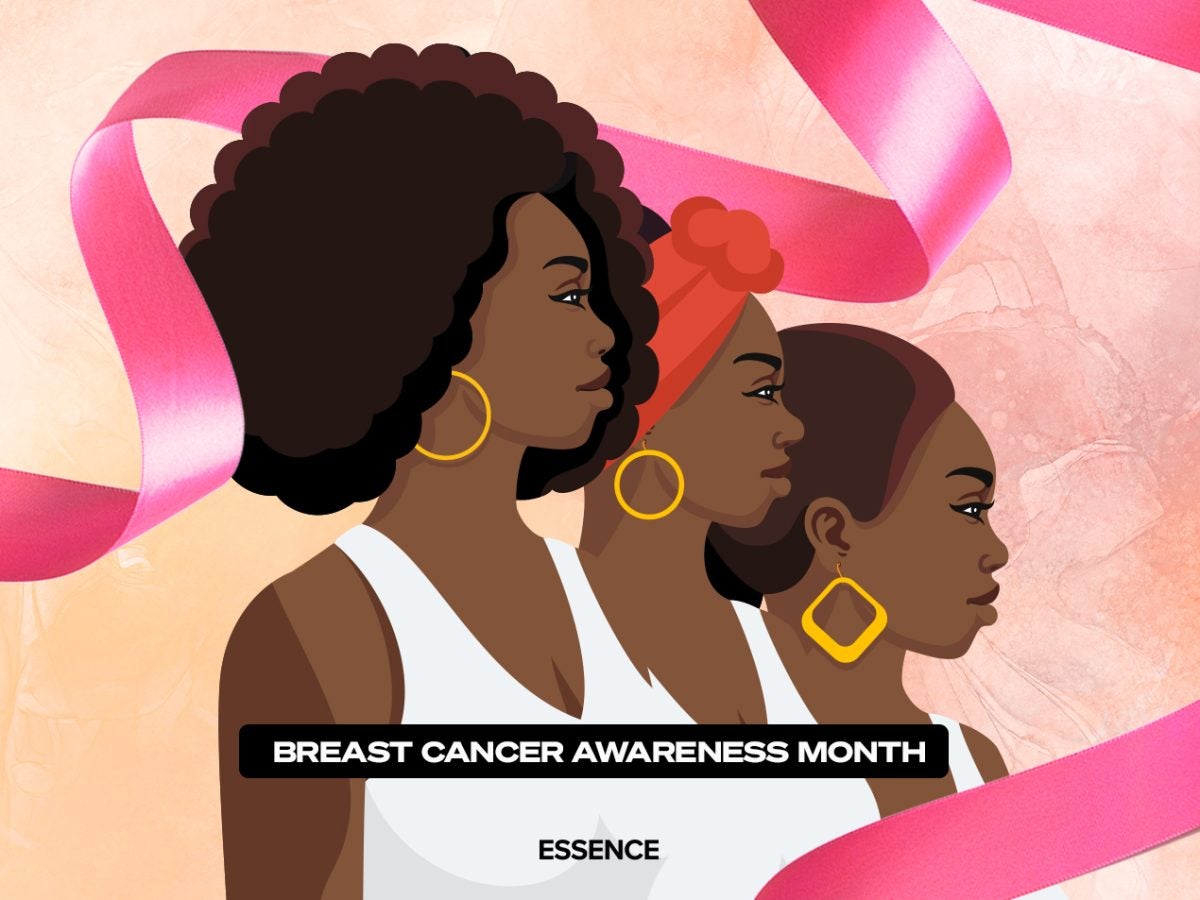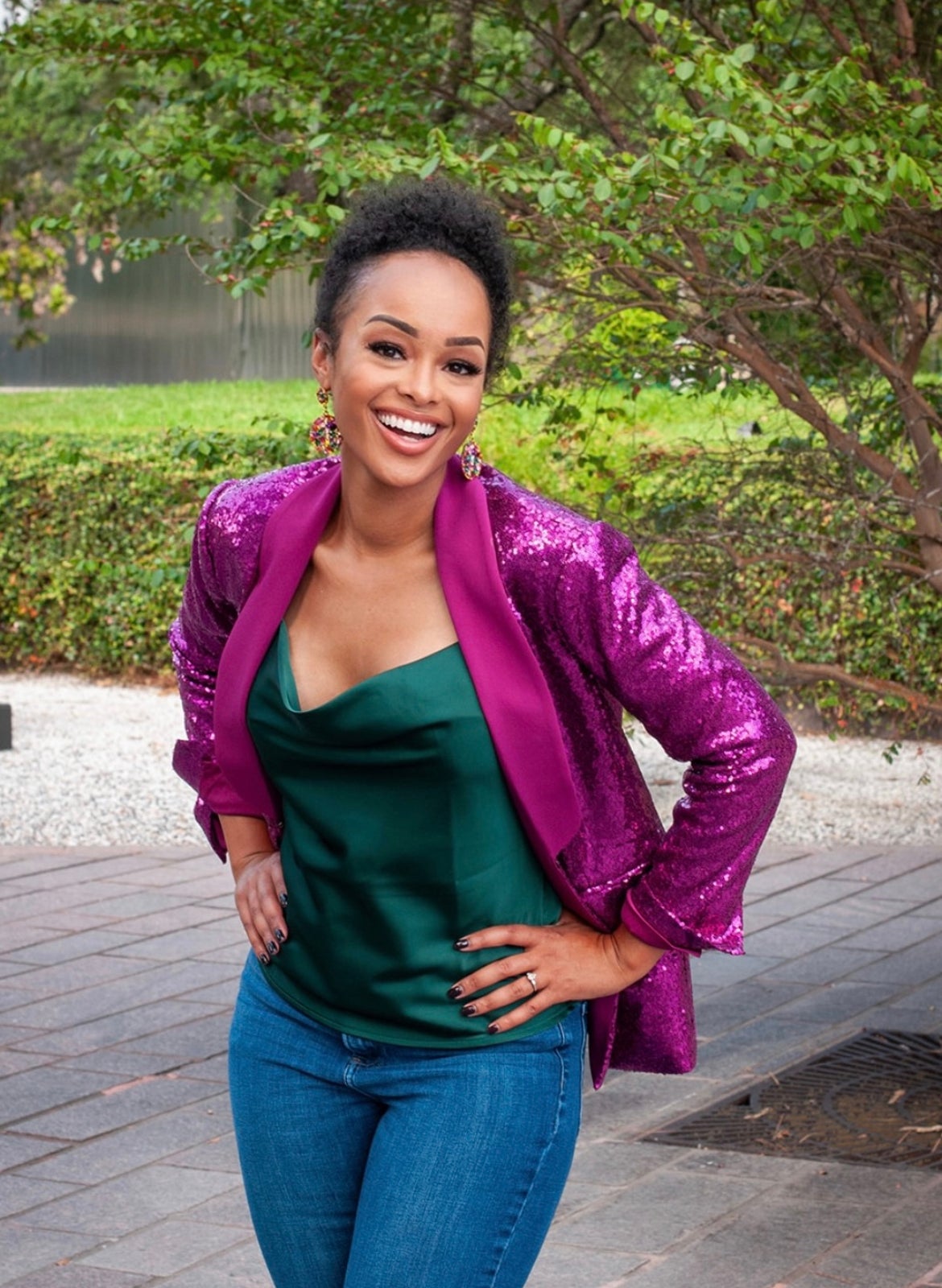
While breast cancer is often thought of as something to be proactive about after 40, in this series, Breast Cancer At Any Age, we speak to women who had scares or battled breast cancer at a much younger age than expected.
“Generational.”
That’s how Ashley Dedmon would describe cancer and the impact the disease has had on her family. “On my maternal side, my great-grandmother, my grandmother and my mother were diagnosed with breast cancer,” she tells ESSENCE. Her mother was 49 when she was diagnosed with metastatic or Stage 4 breast cancer, dying from it at the age of 52. She passed in early 2007, and months afterward, Dedmon received a call that would turn her world upside down even more than it already was.
“That fall, my dad called me while I was on campus [at Prairie View A&M] trying to finish up with my graduation requirements and shared with me that he was diagnosed with prostate cancer,” she says. “And I think that’s really when it shook me; that’s when I was scared for my life because I just truly saw death all around me and I saw what this disease was doing. I really, for the first time, felt like I was next, like it was on the horizon for me.”
But Dedmon wouldn’t let that be her story. At the age of 22, she decided to get proactive and seek out genetic testing to know exactly what her family was dealing with.
“I did not want to die,” she says. “I knew I was at a point in my life where I had a decision to make, and that was to either let this disease continue to wreak havoc in my family or take control of it. And that’s what I did.”
She continues, “I needed to change the trajectory of this disease, and that was done through knowledge and through reaching out to my OB-GYN. And she was a Black woman, and I loved her because she always told me, ‘If your family history changes, don’t wait for your annual, call me and update me. If you find out more information along the way, call me.’ And so that’s what I did, and she empowered me.”
Her doctor helped her to get the BRCA analysis test, Myriad’s MyRisk hereditary cancer test. Through it, Dedmon found out that she was positive for BRCA2, breast cancer gene 2, and had a higher risk of developing breast cancer or ovarian cancer. She began seeing a high-risk oncologist and was made aware of her options. There was hormone therapy, increased surveillance, and prophylactic, or preventative, procedures. Because she was just 22, Dedmon opted for increased surveillance. She got her first mammogram at that age, and for nearly a decade, every six months, she was undergoing breast ultrasounds and MRIs, as well as transvaginal ultrasounds to keep an eye on her ovarian health.
Once she married and welcomed her first child, a daughter, Dedmon started to feel that increased surveillance was no longer enough. “I needed a new course of action. And then that following visit with my high-risk oncologist, I wanted to hear more about prophylactic procedures.”
At 31, she would decide to undergo a preventative double mastectomy, which stirred up a number of complicated feelings.
“It triggered anger from losing my mom. It was doubt. I was really struggling with my faith during that time,” she shares. “I felt alone. I felt like, at the time, I really didn’t know another person who was like me. And by that I mean I didn’t know too many other women who carry a BRCA mutation, let alone them be Black, and so I felt alone.”
But her loved ones reminded her of the reality, which was that she needed to take action. “I had multiple breast cancer diagnoses on my mother’s side. I had a father who had prostate cancer, and the fact was, I carried this mutation, and I have an increased risk compared to the average woman, who was at a 12 to 15 percent risk over her lifetime. And so, when I realized that what I was doing was making an informed decision, and really just praying about it and letting it go, I felt empowered. And so that’s kind of what got me to the surgery.”

After the mastectomy, it was a journey for Dedmon to process everything she’d been through and to feel confident again. “It took time. It took time to heal physically. It took time to heal mentally. It took time to build my stamina back up and get active again,” she says. “It took years to really discover my new normal. And there were intimacy challenges, just me mentally having to get past this expectation, not that my husband put on me, but just society has of what sexy or beautiful is. And having to really get past that and understand that I made a decision to be here for my daughter and my future children. So my husband was very just supportive and very just reassuring that I had made the right decision.”
Following her preventative double mastectomy, she underwent reconstructive surgery with implants three months later, as well as an additional revision surgery. She went on to have her second child too, another daughter, further confirming that she made the right decision as she raises two little girls now. These days, she sees her oncologist once a year for clinical exams in place of mammograms, as they’re no longer necessary post-mastectomy. She continues to undergo transvaginal ultrasounds as well as blood work every six months and sees a gynecologic oncologist to monitor her ovarian health. And now, she tries to inform and educate others about the importance of genetic testings, including friends and family, like her dad. Thankfully, her father is a prostate cancer survivor. He underwent genetic testing at her coaxing, despite initial hesitance.
“He was like, ‘Well, you got it from Mom.’ And I was like, ‘Yeah, probably so. But Dad, you had prostate cancer and BRCA2 is a leading marker for that. That’s the primary reason why we need to know. But secondary, I need some closure. I need to know what information to continue to pass on to your grandchildren and your grandchildren.’ And I think for him, when you bring up grandkids, that will do it,” she says.
In the end, his test came back negative, so it’s believed that the mutation came from Dedmon’s maternal side. With that information, she and her daughters are able to be in control of their risk management, and in turn, their standard of care in the future.
She hopes that by sharing her story, she can help other Black women be in control of their own care. That includes going to annual visits, getting those mammograms, asking questions, and when they don’t get the answers they need, finding another doctor to make it happen. And most importantly, if there is a family history of cancer, she encourages others to tap into genetic testing. By undergoing it herself, Dedmon has empowered her daughters. As they grow up and decide how to proceed knowing their genetic makeup, they can fight tooth and nail as she did to continue to change the trajectory of cancer in their family.
“I’m preparing my girls and talking to them about their family history, about grandma and great-great grandma and so on. And even about me carrying the mutation that I have and what their risks are. And so I think it’s just preparing them now to do what my mom did; make sure I feel empowered about my body and speaking up for myself when something doesn’t feel right, or look right, or smell right or whatever the case may be,” says Dedmon. “And also educating them on when they do express changes with their body and pain to not allow anybody, not even myself, to dismiss it.”
Previous Breast Cancer at Any Age: A Diagnosis Of Triple-Negative BC At 31 Inspired Maimah Karmo’s Fight To Save Lives